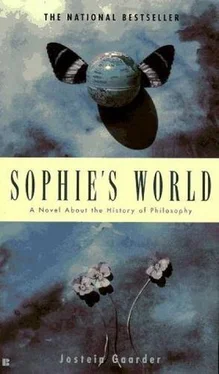Jostein Gaarder - Sophie's World - A Novel About the History of Philosophy
Здесь есть возможность читать онлайн «Jostein Gaarder - Sophie's World - A Novel About the History of Philosophy» весь текст электронной книги совершенно бесплатно (целиком полную версию без сокращений). В некоторых случаях можно слушать аудио, скачать через торрент в формате fb2 и присутствует краткое содержание. ISBN: , Издательство: BERKLEY BOOKS, NEW YORK, Жанр: Философия, на английском языке. Описание произведения, (предисловие) а так же отзывы посетителей доступны на портале библиотеки ЛибКат.
- Название:Sophie's World: A Novel About the History of Philosophy
- Автор:
- Издательство:BERKLEY BOOKS, NEW YORK
- Жанр:
- Год:неизвестен
- ISBN:0-425-15225-1
- Рейтинг книги:4 / 5. Голосов: 1
-
Избранное:Добавить в избранное
- Отзывы:
-
Ваша оценка:
- 80
- 1
- 2
- 3
- 4
- 5
Sophie's World: A Novel About the History of Philosophy: краткое содержание, описание и аннотация
Предлагаем к чтению аннотацию, описание, краткое содержание или предисловие (зависит от того, что написал сам автор книги «Sophie's World: A Novel About the History of Philosophy»). Если вы не нашли необходимую информацию о книге — напишите в комментариях, мы постараемся отыскать её.
Sophie's World: A Novel About the History of Philosophy — читать онлайн бесплатно полную книгу (весь текст) целиком
Ниже представлен текст книги, разбитый по страницам. Система сохранения места последней прочитанной страницы, позволяет с удобством читать онлайн бесплатно книгу «Sophie's World: A Novel About the History of Philosophy», без необходимости каждый раз заново искать на чём Вы остановились. Поставьте закладку, и сможете в любой момент перейти на страницу, на которой закончили чтение.
Интервал:
Закладка:
The Top Hat
… the only thing we require to be good philosophers is the faculty of wonder...
Sophie was sure she would hear from the anonymous letter writer again. She decided not to tell anyone about the letters for the time being.
At school she had trouble concentrating on what the teachers said. They seemed to talk only about unimportant things. Why couldn’t they talk about what a human being is—or about what the world is and how it came into being?
For the first time she began to feel that at school as well as everywhere else people were only concerned with trivialities. There were major problems that needed to be solved.
Did anybody have answers to these questions? Sophie felt that thinking about them was more important than memorizing irregular verbs.
When the bell rang after the last class, she left the school so fast that Joanna had to run to catch up with her.
After a while Joanna said, “Do you want to play cards this evening?”
Sophie shrugged her shoulders.
“I’m not that interested in card games any more.”
Joanna looked surprised.
“You’re not? Let’s play badminton then.”
Sophie stared down at the pavement—then up at her friend.
“I don’t think I’m that interested in badminton either.”
“You’re kidding!”
Sophie noticed the touch of bitterness in Joanna’s tone.
“Do you mind telling me what’s suddenly so important?”
Sophie just shook her head. “It’s ... it’s a secret.”
“Yuck! You’re probably in love!”
The two girls walked on for a while without saying anything. When they got to the soccer field Joanna said, “I’m going across the field.”
Across the field! It was the quickest way for Joanna, but she only went that way when she had to hurry home in time for visitors or a dental appointment.
Sophie regretted having been mean to her. But what else could she have said? That she had suddenly become so engrossed in who she was and where the world came from that she had no time to play badminton? Would Joanna have understood?
Why was it so difficult to be absorbed in the most vital and, in a way, the most natural of all questions?
She felt her heart beating faster as she opened the mailbox. At first she found only a letter from the bank and some big brown envelopes for her mother. Darn! Sophie had been looking forward to getting another letter from the unknown sender.
As she closed the gate behind her she noticed her own name on one of the big envelopes. Turning it over, she saw written on the back: “Course in Philosophy. Handle with care.”
Sophie ran up the gravel path and flung her schoolbag onto the step. Stuffing the other letters under the doormat, she ran around into the back garden and sought refuge in the den. This was the only place to open the big letter.
Sherekan came jumping after her but Sophie had to put up with that. She knew the cat would not give her away.
Inside the envelope there were three typewritten pages held together with a paper clip. Sophie began to read.
WHAT IS PHILOSOPHY?
Dear Sophie,
Lots of people have hobbies. Some people collect old coins or foreign stamps, some do needlework, others spend most of their spare time on a particular sport.
A lot of people enjoy reading. But reading tastes differ widely. Some people only read newspapers or comics, some like reading novels, while others prefer books on astronomy, wildlife, or technological discoveries.
If I happen to be interested in horses or precious stones, I cannot expect everyone else to share my enthusiasm. If I watch all the sports programs on TV with great pleasure, I must put up with the fact that other people find sports boring.
Is there nothing that interests us all? Is there nothing that concerns everyone—no matter who they are or where they live in the world? Yes, dear Sophie, there are questions that certainly should interest everyone. They are precisely the questions this course is about.
What is the most important thing in life? If we ask someone living on the edge of starvation, the answer is food. If we ask someone dying of cold, the answer is warmth. If we put the same question to someone who feels lonely and isolated, the answer will probably be the company of other people.
But when these basic needs have been satisfied—will there still be something that everybody needs? Philosophers think so. They believe that man cannot live by bread alone. Of course everyone needs food. And everyone needs love and care. But there is something else—apart from that—which everyone needs, and that is to figure out who we are and why we are here.
Being interested in why we are here is not a “casual” interest like collecting stamps. People who ask such questions are taking part in a debate that has gone on as long as man has lived on this planet. How the universe, the earth, and life came into being is a bigger and more important question than who won the most gold medals in the last Olympics.
The best way of approaching philosophy is to ask a few philosophical questions:
How was the world created? Is there any will or meaning behind what happens? Is there a life after death? How can we answer these questions? And most important, how ought we to live? People have been asking these questions throughout the ages. We know of no culture which has not concerned itself with what man is and where the world came from.
Basically there are not many philosophical questions to ask. We have already asked some of the most important ones. But history presents us with many different answers to each question. So it is easier to ask philosophical questions than to answer them.
Today as well each individual has to discover his own answer to these same questions. You cannot find out whether there is a God or whether there is life after death by looking in an encyclopedia. Nor does the encyclopedia tell us how we ought to live. However, reading what other people have believed can help us formulate our own view of life.
Philosophers’ search for the truth resembles a detective story. Some think Andersen was the murderer, others think it was Nielsen or Jensen. The police are sometimes able to solve a real crime. But it is equally possible that they never get to the bottom of it, although there is a solution somewhere. So even if it is difficult to answer a question, there may be one—and only one—right answer. Either there is a kind of existence after death—or there is not.
A lot of age-old enigmas have now been explained by science. What the dark side of the moon looks like was once shrouded in mystery. It was not the kind of thing that could be solved by discussion, it was left to the imagination of the individual. But today we know exactly what the dark side of the moon looks like, and no one can “believe” any longer in the Man in the Moon, or that the moon is made of green cheese.
A Greek philosopher who lived more than two thousand years ago believed that philosophy had its origin in man’s sense of wonder. Man thought it was so astonishing to be alive that philosophical questions arose of their own accord.
It is like watching a magic trick. We cannot understand how it is done. So we ask: how can the magician change a couple of white silk scarves into a live rabbit?
A lot of people experience the world with the same incredulity as when a magician suddenly pulls a rabbit out of a hat which has just been shown to them empty.
In the case of the rabbit, we know the magician has tricked us. What we would like to know is just how he did it. But when it comes to the world it’s somewhat different. We know that the world is not all sleight of hand and deception because here we are in it, we are part of it. Actually, we are the white rabbit being pulled out of the hat. The only difference between us and the white rabbit is that the rabbit does not realize it is taking part in a magic trick. Unlike us. We feel we are part of something mysterious and we would like to know how it all works.
Читать дальшеИнтервал:
Закладка:
Похожие книги на «Sophie's World: A Novel About the History of Philosophy»
Представляем Вашему вниманию похожие книги на «Sophie's World: A Novel About the History of Philosophy» списком для выбора. Мы отобрали схожую по названию и смыслу литературу в надежде предоставить читателям больше вариантов отыскать новые, интересные, ещё непрочитанные произведения.
Обсуждение, отзывы о книге «Sophie's World: A Novel About the History of Philosophy» и просто собственные мнения читателей. Оставьте ваши комментарии, напишите, что Вы думаете о произведении, его смысле или главных героях. Укажите что конкретно понравилось, а что нет, и почему Вы так считаете.












